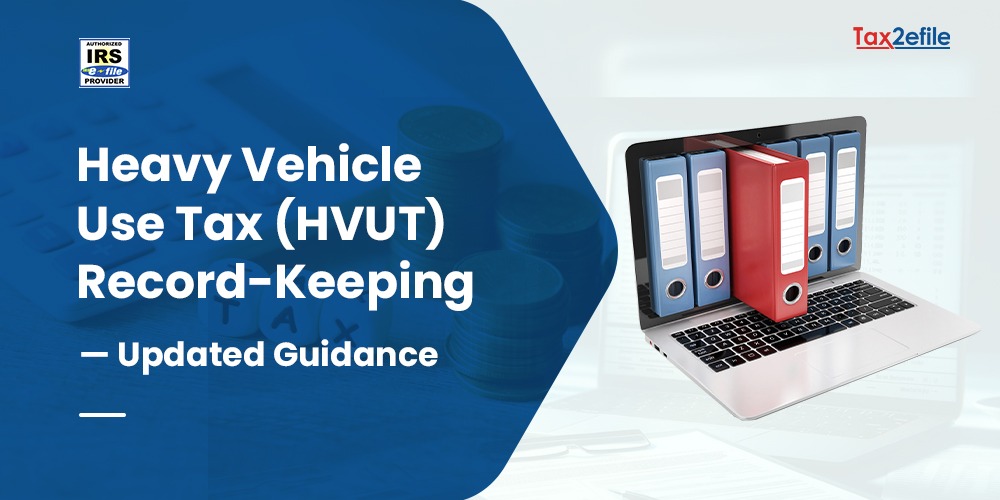- July 9, 2025

The IRS is very explicit and firm regarding its Heavy Vehicle Use Tax (HVUT) compliance. IRS expects every person who submits Form 2290 to have accurate, readily available records for each taxable heavy vehicle they operate on public highways. For the period of 2025–2026, the expectations remain the same. However, sometimes electronic checks and random roadside inspections happen during this period.
Whether you’re a single owner-operator or manage a fleet of 1,000+ trucks, it is important to keep at least three years of records, whether digitally or physical file.
Table of Contents
How Long Should You Keep Form 2290 Records?
According to the latest IRS guidance for 2025–2026:
You are required to keep the copies of your filed Form 2290, Schedule 1, and all supporting documents for at least three years from the later of,
- The date you file the return, or
- The date you pay the tax due.
If the IRS conducts an audit or makes a request for evidence, you must be able to provide these records without delay. The IRS can check these documents during the retention period at any time.
Key HVUT Documents Required for IRS Inspection
IRS requires taxpayers to have full and correct records for all vehicles that are subject to HVUT. Your records should include the following:
Filed Forms and Schedules
- Originals of your Form 2290, along with any amended returns
- Stamped Schedule 1, which is a receipt of your payment for the HVUT.
- Other relevant documents that are related to your HVUT submissions.
Vehicle-Specific Records
- The Vehicle Identification Number (VIN) for each vehicle.
- The gross taxable weight and weight category.
- The registration document corresponds to the weight categories.
- Ownership confirmation: bill of sale, lease agreement, or title.
- Information about acquisition: seller’s name, address, and date of purchase.
- If the vehicle was sold/transferred, the owner’s name, address, and date of the sale are required.
Mileage Logs for Suspended Vehicles
If you claim a vehicle as tax-suspended, mileage logs must support that the truck did not exceed:
- 5,000 miles (standard limit)
- 7,500 miles for qualifying agricultural vehicles.
- Keep odometer readings, GPS records, or ELD data to prove compliance.
Supporting Business Records
- Employer Identification Number (EIN) documentation.
- Proof of business name and address matching the return.
- Financial records showing HVUT tax payments
What Happens If You Fail to Keep Proper HVUT Records?
Failure to provide sufficient HVUT records may lead to:
- Penalties & Fines – IRS penalties for improper documentation
- Delayed Registrations — If you forget to attach Schedule 1, you will not be able to re-register your vehicle at the DMV.
- Disqualification of Suspended Vehicles — If mileage logs are not proper, you may end up losing the suspension status and have to pay back the taxes with interest.
Advanced Record-Keeping Best Practices
1. Digitize Everything
Paper copies alone won’t suffice anymore. The IRS accepts digital files as long as they are accurate, accessible, and secure. Scan your Schedule 1, mileage logs, registration docs, and purchase/sale agreements.
2. Use Secure Cloud Storage
Save digital HVUT records in a cloud storage system that offers multi-factor authentication for accessing it. Reputable providers are those that give you encrypted backups and also allow you to share files quickly if it is necessary.
3. Automated Mileage Tracking
Contemporary ELDs (Electronic Logging Devices) render mileage tracking easier ever. In case your vehicles qualify for suspension, make sure that your ELD data is exportable so that your claim can be supported.
4. Organize By Tax Year
Make separate folders for every tax year and each VIN — this will make it simpler to audit and shorten your search time when finding past records.
5. Perform Internal HVUT Audits
It is advisable to check the status of your records once every year and confirm that they are complete and correspond to the ones that were presented to the IRS. This facilitates the detection of errors early on and lessens the possibility of being fined.
How Tax2efile Simplifies HVUT Record-Keeping for 2290 Filers
At Tax2efile, we understand that record-keeping for heavy vehicle taxes can be a hassle, especially when managing multiple trucks and renewal deadlines. We developed our e-filing platform in such a way that it is not only easy but also efficient to remain compliant throughout the entire process.
Hassle-Free Retrieval
Need your Schedule 1 for a registration renewal or audit? You can log in and download it instantly, anytime, without hassles.
Multi-Year Records in One Place
Returning filers benefit the most — every year’s data stays organized in your account. When it’s time to file for the next period, your vehicle info, business details, and EIN are pre-filled. Just review, update, and submit.
Data Privacy at the Highest Level
Tax2efile uses industry-leading encryption and secure servers to protect your sensitive information. We never store payment details, and only you can access your business data. This means you meet IRS digital record-keeping guidelines without extra effort.
Stay Compliant, Stay Ready
When it comes to the 2025-2026 HVUT season, keeping proper records is more than just compliance — it is a way to avoid unnecessary troubles with the authorities, delays, and fines. Tax2efile’s e-filing is not only a quick way to submit your Form 2290, but it also makes sure you have a digital trail that is safe and always available when you need it.
If you have not filed yet, now is the most appropriate moment. Complete your Form 2290 for the new tax period electronically, receive your stamped Schedule 1 in just a few minutes, and sleep peacefully knowing that your documents are safe, well-organized, and ready if any audits take place for the next three years.


